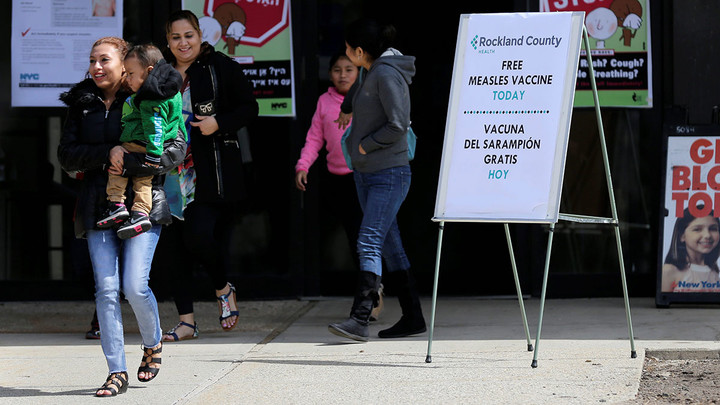Measles, an infectious disease that once disappeared from the earth, has made a comeback in the United States in recent years. According to the Centers for Disease Control and Prevention (CDC), the country has diagnosed a total of 1,282 cases of measles throughout the year. It was the worst year for measles outbreak since 1992.

▲ The number of people diagnosed with measles in the United States over the years is from: CDC
Resurgence of measles, not heavenDisaster, but the Americans did it themselves. The CDC states that most measles patients have not been immunized against measles, and that measles is most likely to spread and outbreak in these populations.
Vaccines are an effective way to prevent infectious diseases. This should be well-known common sense, but nowadays it is considered by some people as a beast. And there are not a few people who have an idea. It is even more surprising that most of these people Middle class with higher education and wealth.
How did these so-called elites become anti-vaccine people? Harvard researchers at measles During the outbreak, 2,500 adults were followed in an attempt to find the cause.
First, why do people refuse to get vaccinated? About one in five respondents gave the following reasons:
- Vaccine is toxic;
- Vaccines can cause autism;
- There is no risk in delaying the vaccine;
- Getting “natural immunity” through illness is better for the body.
Seeing these serious nonsense reasons, I really doubt the education level of the Americans, or the biology class of these people in junior high school must not be learned well, but I still have to explain briefly:
- The viruses used as vaccines are inactivated and have low or no toxicity to humans;
- Vaccines can cause autism-the claim first originated from a paper published in the Lancet by British gastroenterologist Andrew Wakefield at the end of the last century. The data was found to be false and the person later became notorious. A remarkable anti-vaccine person;
- Delaying vaccines is not risky: delaying one person is not risky, and delaying a group of people is dangerous;
- Natural immunity: People may not be able to do so until they develop immunity in the body.

▲ Anti-vaccine campaign picture from: NBC
However, it turns out that you can hardly wake up a person who pretends to be asleep. A Harvard survey shows that the anti-vaccine people’s beliefs are very firm. After five months, 81% of people still hold the same view. Even during the outbreak of measles in the United States and a series of vigorous publicity and popularization in the media, it failed to shake its idea that “there are always people who want to kill people.”
Isn’t there still some people who changed their views? It’s a pity that 64% of them are not lost, but they have misunderstood the vaccine even more, and only 36% have started to change their minds.
Why is this happening? The survey linked changes in cognition to people’s access to information, noting that people who follow social media are more resistant to vaccines, and people who read traditional media reports are more likely to develop the right cognition.
Although it is not certain that media reports and exposures are the direct cause of individuals’ different attitudes towards the vaccine, the report believes that misinformation on social media has a profound impact on people’s willingness and behavior to vaccinate because rumors about vaccines Such media are abundant, and traditional media are more likely to report the benefits and safety of vaccination.

▲ Picture from: Unsplash
It’s also unfair to put the pot on social media. People’s misunderstanding of the vaccine is also related to the mistrust of professionals and the low effectiveness of the national vaccination campaign. However, researchers said that although these anti-vaccine individuals did not believe in information from authoritative sources, they might listen to their doctors. They suggested that doctors take the time to listen to patients and explain patiently the value of the vaccine. Some studies also show effective communication Increases the likelihood that parents will agree to vaccinate their child.

▲ New York, where the measles epidemic is most severe, has begun vaccinations. Picture from: APN < / p>
In addition, since there are many people who believe in social media, the report believes that putting the correct vaccination information on these channels will also help to reverse misconceptions. It also affirms the efforts of social platforms such as Facebook and Twitter to reduce the amount of false information. After all, it is always better to prevent rumors than to prevent them after they appear, although these platformsThese mechanisms and policies sometimes cause counter-effects. They are used by anti-vaccine organizations who are more adept at network operations. How to better utilize the positive publicity role of social media is also a challenge for public health managers.
Title picture from: Unsplash